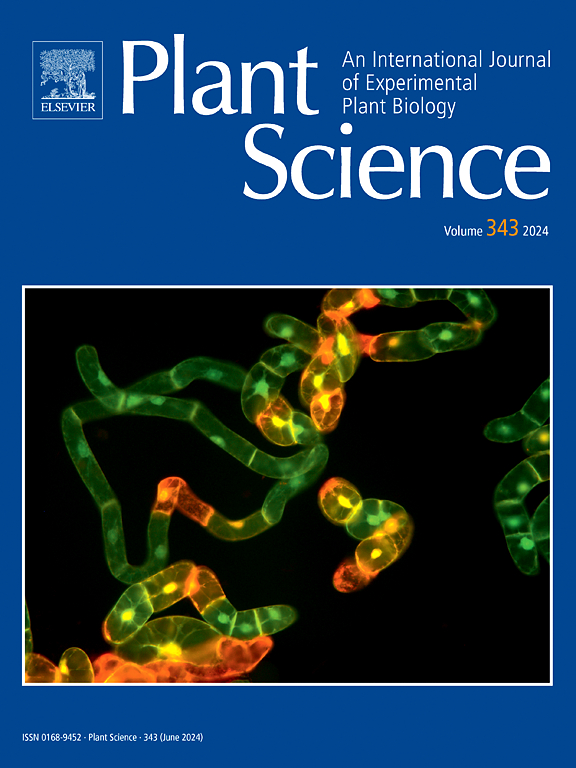Hydrogen sulfide as a key mediator in melatonin-induced enhancement of cold tolerance in tomato (Solanum lycopersicum L.) seedlings
IF 4.1
2区 生物学
Q2 BIOCHEMISTRY & MOLECULAR BIOLOGY
引用次数: 0
Abstract
Melatonin (MT) is a key bioactive molecule that enhances plant tolerance to cold stress; however, the underlying mechanisms remain unclear. This study demonstrates that foliar application of 100 μM MT improves cold tolerance in tomato seedlings by activating antioxidant enzyme systems and cold-responsive pathways. Notably, endogenous hydrogen sulfide (H2S) levels are also elevated, suggesting a potential role in MT-mediated responses. Moreover, treatment with sodium hydrosulfide (NaHS, an H2S donor) further enhances MT-induced cold tolerance by increasing antioxidant capacity, promoting the accumulation of photosynthetic pigments and secondary metabolites, and reducing cold-induced oxidative damage. In contrast, inhibition of H2S signaling using HT (an H2S scavenger) or PAG (an inhibitor of H2S biosynthesis) significantly attenuates the protective effects of MT. Additionally, tomato lines overexpressing the H2S biosynthetic gene SlDCD1 exhibit a more pronounced response to MT-induced cold tolerance than wild-type plants. Conversely, CRISPR/Cas9-mediated knockout of SlDCD1 significantly compromises the protective effects of MT under cold stress. Collectively, the results suggest that H2S signaling plays a central role in MT-mediated cold stress tolerance in tomato seedlings. This work provides new insights into how MT contributes to plant adaptation under cold stress.
硫化氢在褪黑激素诱导的番茄抗寒性增强中的作用幼苗。
褪黑素(Melatonin, MT)是增强植物抗寒性的重要生物活性分子;然而,潜在的机制仍不清楚。本研究表明,叶面施用100μM MT通过激活抗氧化酶系统和冷响应途径提高番茄幼苗的抗寒性。值得注意的是,内源性硫化氢(H2S)水平也升高,表明在mt介导的反应中可能起作用。此外,氢硫化钠(NaHS, H2S供体)通过增加抗氧化能力,促进光合色素和次生代谢物的积累,减少冷诱导的氧化损伤,进一步增强mt诱导的耐寒性。相反,使用HT(一种H2S清除剂)或PAG(一种H2S生物合成抑制剂)抑制H2S信号会显著减弱MT的保护作用。此外,过表达H2S生物合成基因SlDCD1的番茄品系对MT诱导的耐寒性的反应比野生型植物更明显。相反,CRISPR/ cas9介导的SlDCD1敲除显著损害MT在冷胁迫下的保护作用。总的来说,这些结果表明H2S信号在mt介导的番茄幼苗冷胁迫耐受中起着核心作用。这项工作为研究MT如何促进植物在冷胁迫下的适应提供了新的见解。
本文章由计算机程序翻译,如有差异,请以英文原文为准。
求助全文
约1分钟内获得全文
求助全文
来源期刊

Plant Science
生物-生化与分子生物学
CiteScore
9.10
自引率
1.90%
发文量
322
审稿时长
33 days
期刊介绍:
Plant Science will publish in the minimum of time, research manuscripts as well as commissioned reviews and commentaries recommended by its referees in all areas of experimental plant biology with emphasis in the broad areas of genomics, proteomics, biochemistry (including enzymology), physiology, cell biology, development, genetics, functional plant breeding, systems biology and the interaction of plants with the environment.
Manuscripts for full consideration should be written concisely and essentially as a final report. The main criterion for publication is that the manuscript must contain original and significant insights that lead to a better understanding of fundamental plant biology. Papers centering on plant cell culture should be of interest to a wide audience and methods employed result in a substantial improvement over existing established techniques and approaches. Methods papers are welcome only when the technique(s) described is novel or provides a major advancement of established protocols.
 求助内容:
求助内容: 应助结果提醒方式:
应助结果提醒方式:


